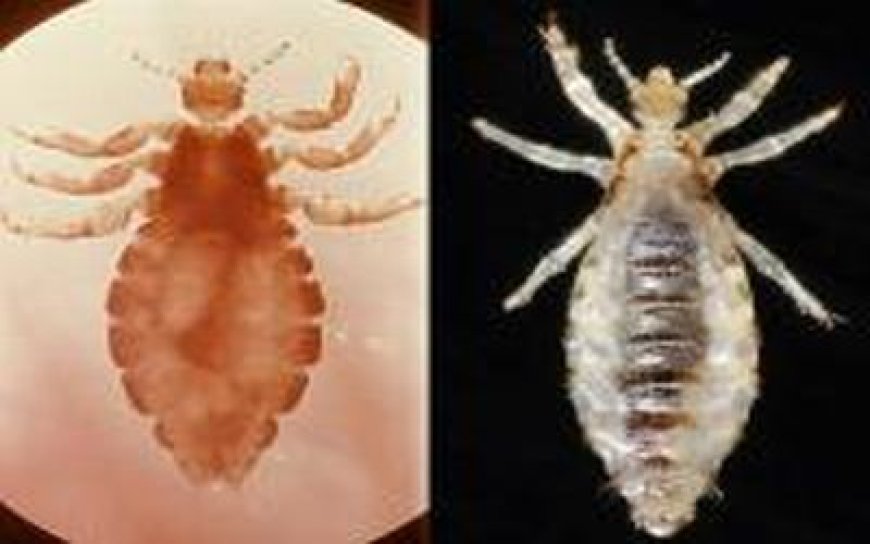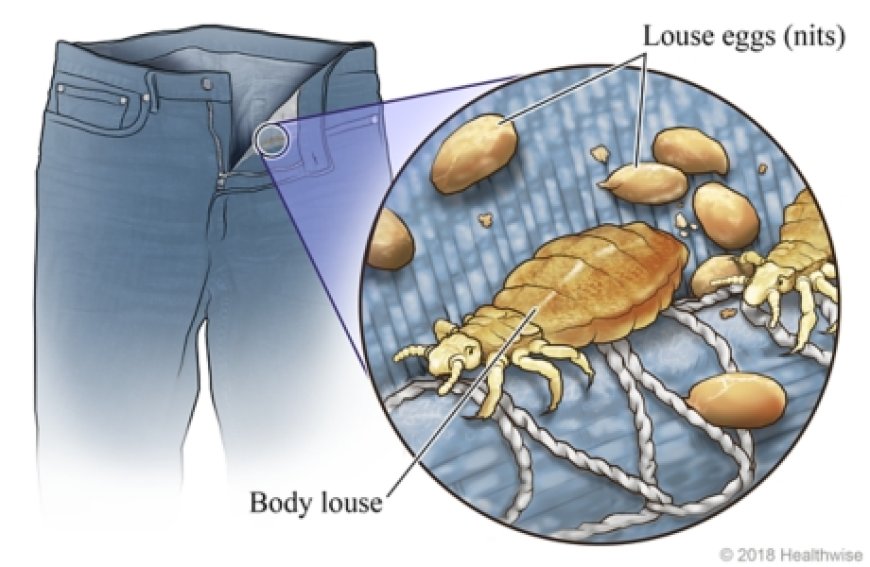"Body Lice: Everything You Need To Know About These Tiny Parasites"
Get up to speed on all the basics of body lice, including their life cycle, common transmission methods, and the best ways to prevent and treat an infestation.
Body lice are parasitic insects that infest humans and feed on their blood. They are typically found in clothing and bedding and can cause a number of health problems.
Body lice are larger than other types of lice, measuring about 2 to 3 millimeters in length. They are usually grayish-white in color and have six legs, which are adapted for clinging onto clothing fibers or human skin. Body lice lay their eggs, or nits, in the seams of clothing and bedding, where they hatch and mature.
Infestation with body lice can cause intense itching, redness, and skin irritation. In addition, body lice can transmit diseases such as typhus, trench fever, and relapsing fever. They are most commonly found in areas of poor sanitation, overcrowding, and poverty, and are often associated with homelessness and refugee populations.
Cause of body lice
Body lice infestation is caused by the human body being in close contact with infested clothing or bedding. Body lice cannot jump or fly, so they are usually spread through direct contact with an infected person or through sharing of clothing, bedding, or other personal items such as towels or combs.
Body lice are most commonly found in areas with poor sanitation, overcrowding, and poverty. They are often associated with homelessness, refugee populations, and situations where people are living in close quarters, such as military barracks or detention centers.
Symptoms of body lice
The symptoms of body lice infestation can include:
- Intense itching and skin irritation: Body lice bites can cause intense itching and skin irritation, which can lead to scratching and potentially cause skin infections.
- Skin infections: Scratching the skin excessively due to the itching caused by body lice bites can lead to skin infections, such as impetigo or cellulitis.
- Poor hygiene: Infestation with body lice can result in poor personal hygiene due to the lack of access to clean clothing and bedding, which can further exacerbate skin problems.
- Spread of diseases: Body lice can transmit diseases such as typhus, trench fever, and relapsing fever, which can cause serious health problems.
- Mental health problems: Living with body lice infestation can cause psychological distress, including anxiety, depression, and social isolation.
When to see doctor
It is recommended to see a doctor if you suspect that you have a body lice infestation. A doctor can confirm the diagnosis and provide appropriate treatment options.
You should also see a doctor if you experience any of the following symptoms:
- Severe itching or skin irritation: If you are experiencing severe itching or skin irritation that is not relieved by over-the-counter treatments, it may indicate a more serious skin condition or infection.
- Skin infection: If you notice signs of skin infection, such as redness, swelling, warmth, or pus, you should see a doctor for treatment.
- Fever: If you develop a fever or other symptoms such as headaches, muscle aches, or a rash, it may indicate that you have contracted a disease from the body lice, and you should seek medical attention.
- Lack of improvement: If you have been treating your body lice infestation for several weeks and have not seen any improvement, you should see a doctor to discuss other treatment options.
It is important to note that body lice infestations can be a sign of poor living conditions and lack of access to basic needs, such as clean clothing and bathing facilities. If you are experiencing homelessness or other challenges that may have led to the infestation, a doctor may be able to refer you to additional resources for support and assistance.
Risk factors
Certain conditions can increase the risk of body lice infestation, including lack of access to clean clothing and bedding, poor personal hygiene, and living in close quarters with others who are infested. People who are homeless, displaced, or living in poverty are particularly vulnerable to body lice infestation.
In addition to the physical discomfort caused by body lice infestation, it can also lead to the spread of diseases such as typhus, trench fever, and relapsing fever.
Prevention
Prevention of body lice infestation involves taking steps to reduce the risk of exposure to the parasites. Here are some tips to help prevent body lice infestation:
- Practice good personal hygiene: Regular bathing and changing of clothes can help prevent body lice infestation.
- Avoid sharing personal items: Do not share clothing, bedding, towels, or other personal items with others, particularly those who may be infested with body lice.
- Wash clothing and bedding in hot water: Regular washing of clothing and bedding in hot water and drying on high heat can kill body lice and prevent infestation.
- Avoid overcrowding: Avoid living in overcrowded or unsanitary conditions, particularly if there are others who are infested with body lice.
- Use insect repellent: Use insect repellent containing DEET when in areas with a high risk of exposure to body lice, such as refugee camps or shelters.
- Seek treatment promptly: If you suspect that you have been exposed to body lice, seek prompt treatment to prevent the infestation from spreading.
By following these tips, you can reduce your risk of body lice infestation and the associated health problems.
Treatment
Treatment of body lice involves a combination of measures to kill the lice and remove their eggs, as well as improving personal hygiene and cleaning of clothing and bedding. Here are some common treatments for body lice:
- Topical insecticides: Over-the-counter and prescription insecticides can be applied to the skin to kill body lice and their eggs. Permethrin is a common topical insecticide used for treating body lice infestations.
- Oral medications: In severe cases, oral medications may be prescribed to kill the lice and their eggs.
- Clothing and bedding treatment: Infested clothing and bedding should be washed in hot water and dried on high heat to kill the lice and their eggs. Items that cannot be washed should be sealed in a plastic bag for at least two weeks to suffocate the lice.
- Personal hygiene: Bathing regularly and changing clothing frequently can help prevent body lice infestation from recurring.
- Environmental cleaning: The living environment should be thoroughly cleaned to remove any lice or eggs that may be present.
It is important to follow the recommended treatment plan to ensure complete elimination of body lice and prevent re-infestation. If you have any questions or concerns about the treatment, it is important to consult with a healthcare provider.
In conclusion, body lice infestation is caused by close contact with infested clothing or bedding and is most common in areas with poor sanitation, overcrowding, and poverty. Infestation can cause intense itching and skin irritation, skin infections, poor hygiene, the spread of diseases, and mental health problems. It is important to see a doctor if you suspect you have a body lice infestation or if you experience any symptoms such as severe itching or skin irritation, skin infections, fever, or lack of improvement with treatment. Prevention measures include good personal hygiene, avoiding sharing personal items, washing clothing and bedding in hot water, avoiding overcrowding, using insect repellent and seeking prompt treatment. By taking these preventive measures, you can reduce your risk of body lice infestation and its associated health problems.
What's Your Reaction?











































